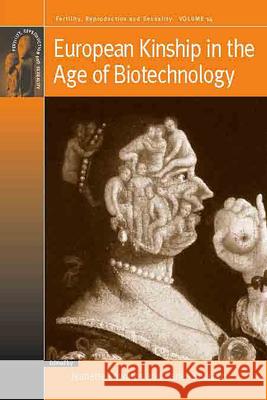European Kinship in the Age of Biotechnology » książka
European Kinship in the Age of Biotechnology
ISBN-13: 9780857453655 / Angielski / Miękka / 2012 / 232 str.
European Kinship in the Age of Biotechnology
ISBN-13: 9780857453655 / Angielski / Miękka / 2012 / 232 str.
(netto: 129,58 VAT: 5%)
Najniższa cena z 30 dni: 135,22
ok. 22 dni roboczych.
Darmowa dostawa!
This superb anthology extends the emphasis on technology that has become such a prominent feature of much recent anthropological work on kinship...In this richly ethnographic text, the most familiar problems produce the most unusual answers...Each chapter brilliantly combines kinship as a matrix with kinship as a tool, using ethnographic examples that leap off the page. Journal of Anthropological Research Interest in the study of kinship, a key area of anthropological enquiry, has recently reemerged. Dubbed 'the new kinship', this interest was stimulated by the 'new genetics' and revived interest in kinship and family patterns. This volume investigates the impact of biotechnology on contemporary understandings of kinship, of family and 'belonging' in a variety of European settings and reveals similarities and differences in how kinship is conceived. What constitutes kinship for different publics? How significant are biogenetic links? What does family resemblance tell us? Why is genetically modified food an issue? Are 'genes' and 'blood' interchangeable? It has been argued that the recent prominence of genetic science and genetic technologies has resulted in a 'geneticization' of social life; the ethnographic examples presented here do show shifts occurring in notions of 'nature' and of what is 'natural'. But, they also illustrate the complexity of contemporary kinship thinking in Europe and the continued interconnectedness of biological and sociological understandings of relatedness and the relationship between nature and nurture. Jeanette Edwards is Professor of Social Anthropology at Manchester University. She has published widely on the implications of new reproductive technologies for kinship both ethnographically and theoretically. She directed the European-funded project 'Public Understanding of Genetics: a Cross-Cultural and Ethnographic Study of the "new genetics" and social identity'. Carles Salazar is Lecturer in Social Anthropology at the University of Lleida. He received his Ph.D. from the University of Cambridge, has carried out ethnographic fieldwork in Ireland and Catalonia (Spain) and published work on kinship, sexuality, reproduction and Irish ethnography.
This superb anthology extends the emphasis on technology that has become such a prominent feature of much recent anthropological work on kinship...In this richly ethnographic text, the most familiar problems produce the most unusual answers...Each chapter brilliantly combines kinship as a matrix with kinship as a tool, using ethnographic examples that leap off the page. Journal of Anthropological Research
Interest in the study of kinship, a key area of anthropological enquiry, has recently reemerged. Dubbed the new kinship, this interest was stimulated by the new genetics and revived interest in kinship and family patterns. This volume investigates the impact of biotechnology on contemporary understandings of kinship, of family and belonging in a variety of European settings and reveals similarities and differences in how kinship is conceived. What constitutes kinship for different publics? How significant are biogenetic links? What does family resemblance tell us? Why is genetically modified food an issue? Are genes and blood interchangeable? It has been argued that the recent prominence of genetic science and genetic technologies has resulted in a geneticization of social life; the ethnographic examples presented here do show shifts occurring in notions of nature and of what is natural. But, they also illustrate the complexity of contemporary kinship thinking in Europe and the continued interconnectedness of biological and sociological understandings of relatedness and the relationship between nature and nurture.
Jeanette Edwards is Professor of Social Anthropology at Manchester University. She has published widely on the implications of new reproductive technologies for kinship both ethnographically and theoretically. She directed the European-funded project Public Understanding of Genetics: a Cross-Cultural and Ethnographic Study of the "new genetics" and social identity.
Carles Salazar is Lecturer in Social Anthropology at the University of Lleida. He received his Ph.D. from the University of Cambridge, has carried out ethnographic fieldwork in Ireland and Catalonia (Spain) and published work on kinship, sexuality, reproduction and Irish ethnography.











